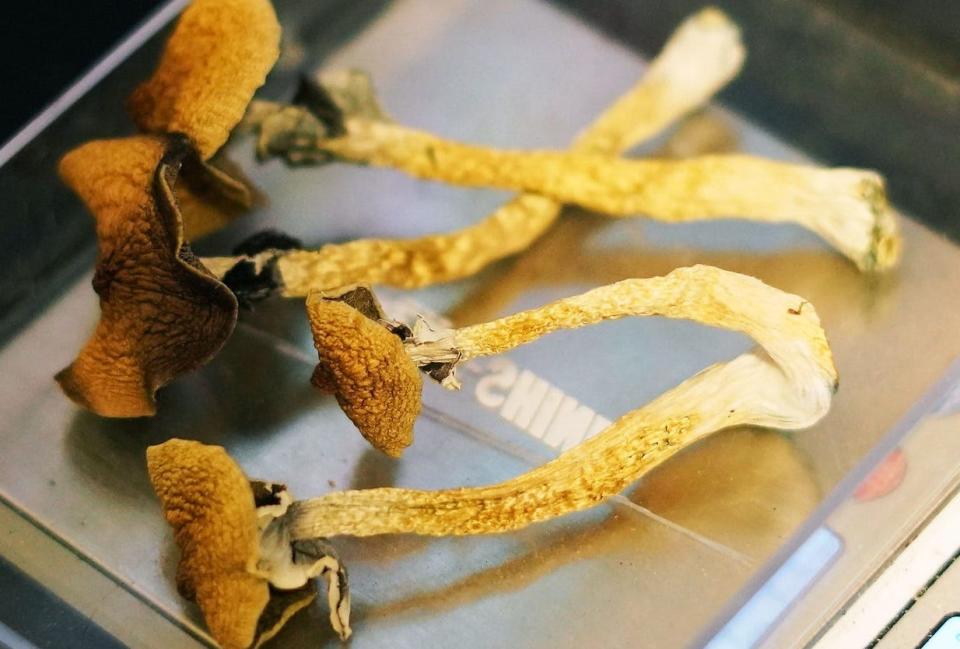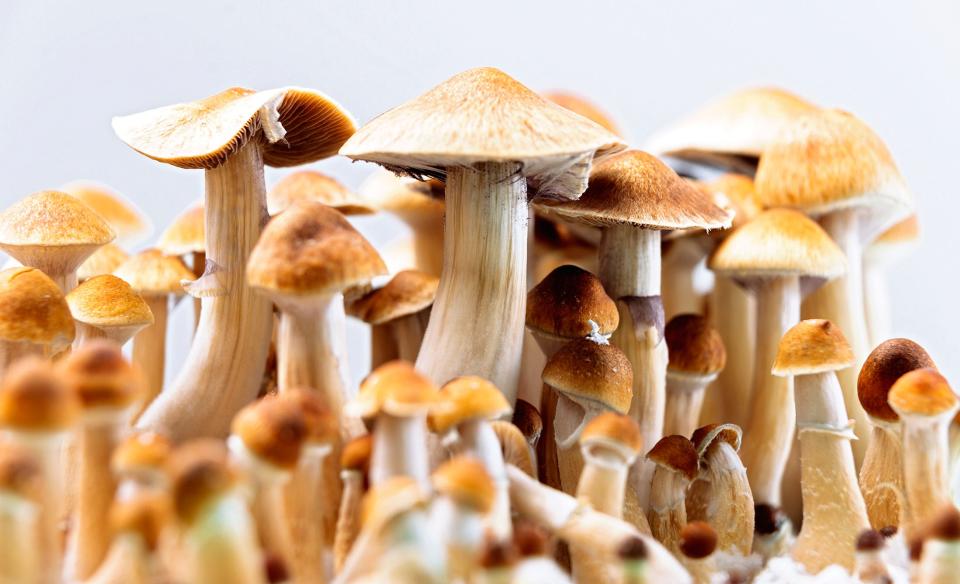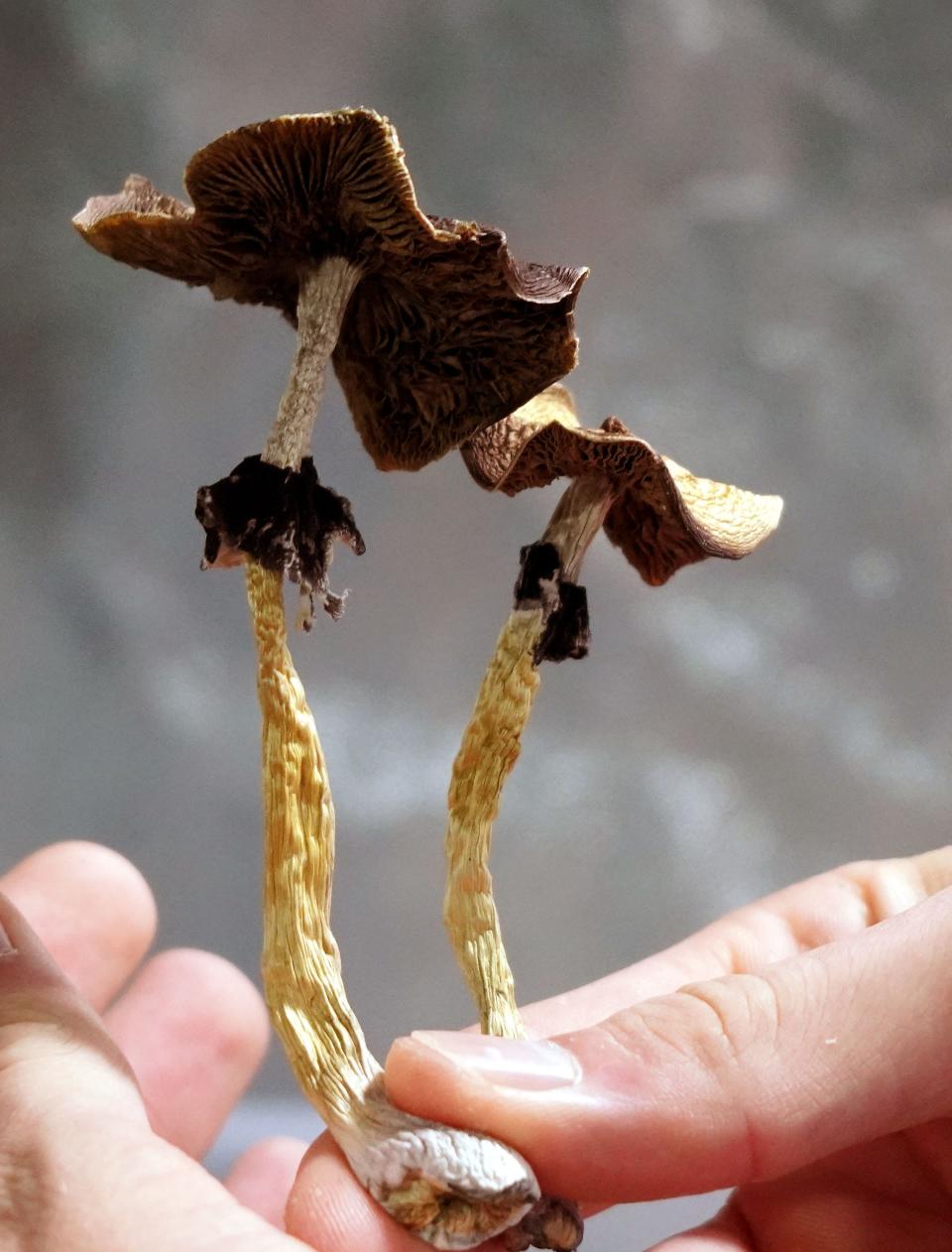Can 'magic' mushrooms treat mental health issues? Yes, but experts say use with caution
When Snehal Bhatt left New Jersey for New Mexico in 2009, he was reluctant to tell people about his research goals.
Now a faculty member at Rutgers' Robert Wood Johnson Medical School and a professor of psychiatry and behavioral sciences at the University of New Mexico, Bhatt went west to participate in a clinical trial involving psilocybin, the psychedelic compound produced by so-called "magic" mushrooms.
"Ten years ago, this type of research was stigmatized," he said. "In the last five years, that has changed."
As of early 2023, a swell of social acceptance and clinical support has buoyed optimism about the future of psilocybin, ketamine and MDMA, also known as ecstasy or molly, as treatments for anxiety, post-traumatic stress disorder, alcoholism and other mental health issues.
Though the science behind the efficacy of these drugs remains a work in progress due to government-influenced delays, some researchers believe they have the potential to enhance or surpass current clinical options for certain diagnoses.
Over the next two years, the Food and Drug Administration is likely to approve MDMA and psilocybin as mental health treatments, according to federal Department of Health and Human Services records. Ketamine, an anesthetic that can cause a powerful non-ordinary state of reality, is already in use.
'Potential for harm is there'

Rena Beyer, a psychotherapist based in Cherry Hill, became a ketamine-assisted therapist in 2017. She said most of her clients tried multiple prescription drugs or plateaued in therapy before turning to ketamine. They come with a willingness to consider unconventional options for their mental health struggles, she said. Often they find relief, she added.
Beyer and other experts nonetheless warn that anyone willing to experiment with these drugs should proceed with caution. Although ketamine may provide treatment to those suffering from mental health issues, Beyer said, it is not a cure.
"There's a lot of promise here, but there's also a lot of unanswered questions," said Bhatt. "Many in this field try to be super careful about the message we are giving. These drugs seem to be safe in a clinical context, but the potential for harm is there."
Nurse's journey" The Unsung: NJ nurse travels the world to make sure children can smile
Psilocybin in 2018 earned “breakthrough therapy” status from the federal Food and Drug Administration to permit medical trials for clinical depression. Controlled doses have benefited treatment programs for depression, anxiety and other mental health issues, according to researchers.
MDMA, a synthetic psychoactive stimulant more commonly known as ecstasy or molly, has likewise shown significant promise in trials for treating post-traumatic stress disorder. Ketamine, meanwhile, has anti-depressant effects and an FDA-approved derivative already in use.
All three target the same brain system, but they do it in different ways, said Petros Levounis, the chair of the Department of Psychiatry at Rutgers New Jersey Medical School. The desired result is nonetheless the same. They help create a state of neuroplasticity that lets people address their chronic psychiatric issues from a new perspective.
Ketamine: the good and the bad

Beth Haessig, a licensed psychologist based in Denville, has been practicing ketamine-assisted psychotherapy since 2021. She and Beyer likened ketamine to a tool for accessing a client's emotions and perspectives without the typical layers of fear and social defense.
Much as it allows surgeons to perform more invasive surgeries, ketamine allows clients to go deeper — accelerating what may be a slow process of self-exploration, Haessig said.
"It's not going to make you say anything you don't want to say," Beyer said "But it's going to make you feel ready to talk — even about things you previously couldn't talk about or felt ashamed talking about"
The destabilizing effects and feelings of openness and vulnerability mean ketamine is not ideal for everyone, Haessig said. Clinical studies are showing progress, but they come with a regimented screening process and support system. Moreover, the effect of ketamine and other psychoactive drugs can be heavily dependent on the user's mindset, where the drugs are taken and with whom, Haessig said.
"The potential is as big as the risk for these drugs," Haessig said.
Levounis, a specialist in addiction psychiatry and the president-elect of the American Psychiatric Association, said much work remains before ketamine, psilocybin or MDMA can be fully supported as mainstream medical treatments.
Psilocybin for alcohol use disorder?

There are drug interactions, optimal doses and impacts on pregnant women to determine, Levounis said. Long-term effects are of particular concern.
"There are so many things that go into checking a particular substance before we can support its use," Levounis said. "That being said, I can appreciate how people suffer from severe depression, from severe alcohol use disorders and severe addiction and are looking at the enthusiasm behind psychedelics as a possible solution."
One study published in 2022 by the Journal of the American Medical Association found that psilocybin paired well with therapy for the treatment of alcohol use disorder.
Though there are existing FDA-approved drugs to help treat alcohol use disorder and stem its social impacts, they don't work for everyone, said Bhatt, who was involved with the study.
The study, conducted at two U.S. academic centers, found that two doses of psilocybin paired with intensive therapy could reduce heavy drinking by 80% or more.
While participants benefited from the initial therapy sessions, Bhatt said, the addition of lab-created psilocybin powder caused their heavy alcohol use to decrease considerably and stay low — even months after a dose or therapy.
Nearly half of the participants stopped drinking entirely by the end of an eight-month trial. Meanwhile, only a quarter of those given the placebo, Benadryl, were able to quit. Drinking on average was cut from more than once every two days to once every four. Negative side effects, mostly nausea, anxiety and headaches, were fleeting. It took the treatment to another level, Bhatt said.
"After they receive psilocybin, their motivation to stop drinking just shoots up. Their self-efficacy, their belief that 'I can stop drinking,' goes up. Their cravings go down," Bhatt said.
Psychedelic drugs have been studied before

The research was inspired, in part, by trials dating back to the mid-20th century. The study's authors referred to studies from about 50 years ago or more that assessed the use of lysergic acid diethylamide, or LSD, to combat alcohol use disorder. A psychedelic drug, like psilocybin, LSD then showed promise in reducing alcohol misuse. Over six separate trials, people treated with LSD were nearly twice as likely to demonstrate remission as those who received a placebo, the study's authors wrote.
Some of those early studies deserved to be revisited, Bhatt said.
However, there remains a stigma, at least partially due to the so-called war on drugs. While some experiments with psychedelic medicine showed promise, others caused setbacks that haunted medical research on mind-altering drugs for decades.
Prostheses costs: Limb loss can make being active in New Jersey expensive. These resources can help
Scientific experiments in the 1950s and recreational experimentation by a 1960s counterculture ultimately led to public and political backlash. Among the opposition's early leaders were the Johnson and subsequent Nixon administrations, which declared a "war on drugs" most famously continued by the Reagan administration.
Possession of LSD became a federal offense in 1968. In 1971, the drug was classified alongside its fellow psychedelic psilocybin as a Schedule 1 drug under the United Nations guidelines. MDMA joined them in 1985. The government's stance was and is that these drugs have no medical benefits, despite research that pointed to a potential range of clinical uses.
How close are we to psychedelic treatments?
More recently, some politicians have sought to change their status.
In November 2022, U.S. Sens. Cory Booker, D-N.J., and Rand Paul, R-Ky., introduced legislation that would enable the Drug Enforcement Administration to regulate breakthrough therapies using MDMA and psilocybin as medically acceptable. The Breakthrough Therapies Act would ease FDA-approved pilot programs and other research and development efforts backed by the Biden administration in areas including addiction and overdose, chronic pain, and mental health issues.
"Recent studies suggest that some Schedule 1 substances such as MDMA and psilocybin could represent an enormous advancement for the treatment of severe post-traumatic stress disorder, depression and addiction,” Booker said. “Unfortunately, regulatory red tape and a series of bureaucratic hurdles … impedes critical research."
The shift in sentiment in Washington, D.C., is reminiscent of the changing view on marijuana and reflective of public interest and acceptance. The latter heightened significantly after the release of Harvard professor Michael Pollan's 2018 book about psychedelic therapy, “How to Change Your Mind,” and anecdotal claims from celebrities about the benefits of psilocybin use.
Perhaps aided by growing criticism of the pharmaceutical industry and a growing appreciation for the therapeutic effects of cannabis, the erosion of skepticism for certain street drugs as beneficial for health is nonetheless a double-edged sword, according to experts.
"There is a danger for people to put their faith in psychedelics and not pursue tried and true intervention, psychotherapy and medication," said Levounis, of Rutgers. "They can be hurt by it, and they may be less likely to engage in treatments that are safe and effective."
Adding to that danger is the fact that many of these drugs are already available, Bhatt said. Ketamine can be bought over the internet without a prescription. Mushrooms and MDMA can be found on the black market.
Bhatt said it can be difficult to overdose on these drugs in a way that would be physically dangerous, but cautioned that they can still cause psychological harm.
Another problem: Current research shows that more intense doses, rather than so-called micro-doses, may be necessary to break through neurological barriers and see the desired benefits, Bhatt said.
"These are powerful medications that can lead to intense emotional responses," he said. "We're exploring doses to avoid the perceptual changes and intense emotions, but that data isn't there. What we're seeing in these big studies is that the dose really does matter."
"I don't recommend that people just pick up a bag," he added.
How does the treatment work?
Clients of Haessig, the Denville psychologist, obtain ketamine from Journey Clinical, a company that provides the prescription and mails them the drug in lozenge form.

Beyer's clients, on the other hand, take it intravenously with the assistance of a doctor. That allows for a more controllable, finely tuned dose to put clients in the proper dissociative state, said Beyer, the Cherry Hill psychotherapist.
Ideally, the feeling Beyer wants clients to achieve is akin to an out-of-body experience, she said.
"It's like watching yourself in a movie," she said.
The goal for therapists is to get clients into a state where they feel calm and safe. That state nonetheless can leave clients feeling vulnerable. Having a preexisting bond with a therapist can be helpful, Beyer said.
"The rapid mood shift can be scary," she said. "It can also be scary how quickly you get better, and how rapidly the changes in personality come on. It's been called the therapeutic bends."
Beyer stressed that ketamine-assisted therapy is not a cure. Mostly used for treatment-resistant depression, it can be problematic for some, exacerbating conditions such as psychosis.
Some people may see negligible benefits or none at all, Beyer said. A small percentage feel great after just one or two sessions.
"Most are in the middle," she said. "They make progress in their mood, they feel as though they have their life back, and there is still therapeutic work to be done in their ketamine therapy sessions."
Haessig recommends ketamine therapy on a Friday to allow a weekend for processing as the brain makes new connections. Ketamine therapy sessions generally last about two hours. The effects nonetheless linger. Revelations can come days after use, she said.
East Coast not as open to treatment as West Coast
Beyer, who became a ketamine-assisted therapist in 2017, said the practice remains stigmatized, but more so from within the medical profession than among potential clients and more so in the East than the West.
The West Coast has been more progressive in adopting ketamine-assisted therapy, but it remains an almost clandestine business in the East. Therapists can be wary of their clients' participating in ketamine-assisted therapy, Beyer said. Some are unfamiliar with the practice, she said. Others have an unfavorable outlook on combining therapy with psychedelic medicine.
There is a similar lag in the East when it comes to psilocybin.
In New Jersey, state Senate President Nicholas P. Scutari introduced legislation in 2022 that would decriminalize the use of psilocybin for adults at least 21 years old and permit the drug's use for behavioral health care. It has not been brought to the Senate floor for a vote, however.
Early in 2023, Oregon became the first state to legalize psilocybin for adult use. Its retail sale remains banned, but it can be taken at a licensed service center under the watch of a trained ward. Bhatt said that's probably for the best.
As time goes on, acceptance is growing, said Beyer.
Graduate schools at Harvard University, Fairleigh Dickinson University and others are including ketamine-assisted therapy programs in their courses of study. In 2022, the University of California at Berkeley opened a certificate course for psychedelic facilitation.
Beyer said she believes that the U.S. is only in the early stages of embracing psychoactive substances for therapeutic purposes. More than that, Beyer said, she can imagine a scenario in which drugs such as ketamine, psilocybin and MDMA are used proactively for personal health betterment rather than simply as treatments.
This article originally appeared on NorthJersey.com: Can LSD, ecstasy and psilocybin help mental health issues?

